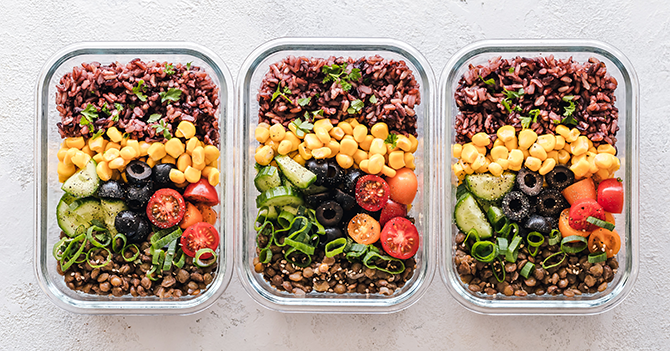The Ultimate Sugar Free Sauces Taste Test: Which One Wins?
The Ultimate Sugar Free Sauces Taste Test: Which One Wins?
Blog Article
Everything About Healthy And Balanced Food: Advantages of Checking Out Plant Based Choices
The discussion surrounding plant-based diet plans has acquired significant attention in recent times. Many people are discovering the possible health and wellness benefits, nutritional benefits, and ecological effects related to these dietary choices. As individuals end up being a lot more knowledgeable about their food's influence on health and sustainability, inquiries develop about the practicalities of taking on such a way of living. What particular changes can one anticipate, and exactly how might these options reshape not just personal wellness however also the earth's future?
Recognizing Plant-Based Diet Plans
Although many individuals connect plant-based diets mostly with vegetarianism or veganism, these diet plans can incorporate a vast variety of eating patterns that focus on entire, minimally processed plant foods. Such diets often include fruits, veggies, whole grains, nuts, beans, and seeds, while limiting or eliminating animal products. This adaptability allows people to customize their dietary options according to individual preferences and nutritional requirements. Some might adopt a mostly plant-based diet while still sometimes consuming meat or milk, frequently described as a flexitarian strategy. The focus stays on integrating even more plant foods, which can lead to a diverse range of tastes and dishes. Understanding these different interpretations of plant-based consuming is crucial for appreciating its ease of access and charm in modern food society.
Wellness Perks of Plant-Based Foods
The health and wellness advantages of plant-based foods are significant, supplying a nutrient thickness benefit that sustains total health. Study shows that these foods can improve heart health and play a vital function in efficient weight monitoring. By including extra plant-based alternatives, people might boost their nutritional selections and advertise lasting wellness.
Nutrient Thickness Benefit
Nutrient density plays an important role in the health benefits of plant-based foods, making them an engaging selection for those looking for a well balanced diet plan. Plant-based foods, such as fruits, vegetables, legumes, nuts, and whole grains, are often abundant in crucial vitamins, minerals, and anti-oxidants while being lower in calories. This high nutrient density allows people to take in fewer calories while still meeting their dietary requirements. Furthermore, these foods are loaded with dietary fiber, advertising digestive system health and wellness and helping in weight management. By including nutrient-dense plant-based alternatives, consumers can enhance their total health and wellness, support their body immune systems, and minimize the risk of persistent diseases. Ultimately, the nutrient thickness of plant-based foods highlights their importance in a health-conscious way of living.
Heart Wellness Renovation

Weight Management Support
Along with promoting heart health, a plant-based diet regimen can significantly aid in weight monitoring. This dietary strategy highlights entire foods such as fruits, vegetables, beans, nuts, and whole grains, which are generally lower in calories and greater in fiber compared to animal-based items. The high fiber content aids enhance satiety, decreasing general calorie consumption. Plant-based diet regimens are frequently abundant in important nutrients while reduced in harmful fats, making it simpler to keep a healthy weight. Research study shows that people who embrace a plant-based way of living tend to have reduced body mass indexes (BMIs) and experience even more effective weight-loss contrasted to those that consume meat-heavy diet plans. Welcoming plant-based options is a tactical option for efficient weight monitoring.
Nutritional Worth of Plant-Based Active Ingredients
Plant-based ingredients are rich in vital nutrients, supplying a varied selection of vitamins, minerals, and anti-oxidants that contribute to overall health. A comparison of protein sources reveals that while animal products are frequently deemed exceptional, lots of plant-based choices supply ample healthy protein and various other helpful substances. Comprehending the nutritional value of these ingredients can help individuals make notified dietary selections.
Vital Nutrients in Plants
Nutrient-rich components located in plants supply a varied array of necessary vitamins and minerals that contribute greatly to overall health and wellness. These ingredients are rich in vitamins A, C, and K, which support immune function, vision, and blood clotting, specifically. In enhancement, plants supply crucial minerals such as calcium, magnesium, and potassium, essential for heart health, muscular tissue feature, and bone toughness. The presence of fiber in plant-based foods aids digestion and promotes a healthy intestine microbiome. Anti-oxidants, found perfectly in vegetables and fruits, help combat oxidative stress and anxiety and decrease swelling. Lots of plant foods are low in calories yet high in nutrients, making them an excellent option for those looking for to preserve a healthy and balanced weight while making sure optimal nutrient consumption.

Contrasting Healthy Protein Sources
Protein resources differ substantially in their nutritional accounts, with plant-based active ingredients providing unique advantages. Unlike animal proteins, which usually contain hydrogenated fats and cholesterol, plant healthy proteins have a tendency to be lower in these undesirable elements. Legumes, nuts, seeds, and whole grains are rich in essential amino acids, fiber, vitamins, and minerals. For circumstances, lentils offer high protein content alongside substantial iron and folate, while quinoa is a total healthy protein, supplying all nine important amino acids. In addition, plant-based proteins are often gone along with by antioxidants and phytochemicals that sustain overall wellness. The shift to plant-based protein sources not just improves nutritional intake yet additionally aligns with sustainable nutritional methods, reducing environmental influence and promoting long-term health advantages.
Environmental Impact of Plant-Based Eating
As awareness of climate change grows, lots of people are exploring sustainable dietary choices that can significantly decrease their ecological impact. Plant-based eating has actually become a substantial contributor to decreasing greenhouse gas exhausts, which are largely related to animals manufacturing. The farming of fruits, grains, vegetables, and beans generally needs less sources, such as water and land, compared to pet farming. In addition, plant-based diets can result in reduced logging, as less land is needed for grazing livestock or expanding pet feed. By moving in the direction of plant-based options, consumers can support biodiversity and promote much healthier communities. Generally, welcoming plant-based consuming not just benefits individual wellness but likewise represents an essential action towards ecological sustainability and preservation efforts.
Overcoming Common Misconceptions
While lots of people acknowledge the benefits of a plant-based diet plan, numerous misconceptions typically prevent them from fully accepting this way of living. An usual idea is that plant-based diet regimens do not have adequate healthy protein; nevertheless, various plant resources, such as beans, nuts, and tofu, give adequate healthy protein. In addition, some think that this diet plan is expensive, when actually, staples like beans, rice, and seasonal vegetables can be quite economical. An additional misunderstanding is that plant-based eating is overly restrictive, whereas it actually supplies a varied selection of flavors and foods. Many worry that a plant-based diet regimen may lead to shortages, yet with appropriate preparation, individuals can get all required nutrients, consisting of minerals and vitamins, while appreciating a large variety of scrumptious meals. Large Tips for Transitioning to a Plant-Based Way of living
Making the change to a plant-based way of living can be an enriching experience, though it commonly requires some advice to navigate the initial adjustments. First, people are urged to start progressively, integrating even more fruits, vegetables, legumes, and entire grains right into their meals while minimizing meat and dairy products consumption. Dish preparation is vital; preparing a weekly menu can help relieve the adjustment and avoid final harmful choices. Exploring brand-new recipes and cooking methods can additionally improve the experience and preserve excitement about plant-based consuming. In addition, signing up with support system or communities can offer motivation and share valuable suggestions. Staying notified regarding nutrition guarantees well balanced dishes, avoiding shortages while fostering a healthy and balanced, satisfying plant-based lifestyle.

Delicious Plant-Based Dish Concepts
Checking out scrumptious plant-based dish ideas can motivate individuals to accept a more healthy diet regimen. One popular choice is a hearty quinoa salad, including cherry tomatoes, find more cucumber, and a zesty lemon-tahini dressing. An additional fave is a tasty lentil stew, loaded with carrots, celery, and fragrant herbs, best for a comforting dinner. For breakfast, over night oats made with almond milk, chia seeds, and covered with fresh berries offer a healthy beginning to the day. In addition, a dynamic veggie stir-fry with tofu and a selection of colorful veggies can be a quick yet satisfying meal. Velvety avocado salute on whole-grain bread, sprinkled with seasonings and seeds, supplies a basic yet tasty snack. These meals showcase the range and richness of plant-based consuming.

Frequently Asked Inquiries
Can a Plant-Based Diet Plan Offer Sufficient Healthy Protein?
The concern of whether a plant-based diet can give adequate healthy protein prevails. Many sources, consisting of legumes, nuts, seeds, and whole grains, can satisfy protein requires efficiently, supporting a well balanced and nutritious diet regimen for individuals.
Are Plant-Based Diets Appropriate for Children?
The viability of plant-based diets for youngsters depends on mindful planning. Ample nutrients should be assured, including minerals, vitamins, and healthy proteins. With proper advice, such diets can sustain healthy click and balanced growth and growth in children.
Exactly how Do I Eat Out on a Plant-Based Diet?
Eating out on a plant-based diet includes looking for dining establishments with diverse food selections, requesting for modifications, and checking out vegan-friendly alternatives. Planning ahead and connecting nutritional preferences can improve the eating experience while keeping dietary options.
What Prevail Irritants in Plant-Based Foods?
Common allergens in plant-based foods consist of soy, gluten, nuts, and seeds - Plant Based Chicken. Individuals adhering to a plant-based diet regimen should know these allergens and check out tags carefully to stay clear of adverse reactions and ensure risk-free intake
Can Plant-Based Diets Aid With Weight Reduction?
Research study suggests that embracing a plant-based diet regimen may assist in fat burning due to its generally lower calorie density and higher fiber content. This combination can enhance satiation, assisting individuals handle their caloric intake efficiently. Numerous individuals connect plant-based diet plans mostly with vegetarianism or veganism, these diets can encompass a wide range of consuming patterns that focus on entire, minimally refined plant foods. Nutrient thickness plays a necessary function in the health and wellness benefits of plant-based foods, making them a compelling choice for those looking for a well balanced diet plan. Plant-based diet plans have been my website shown to considerably improve heart wellness, as they usually include elements that sustain cardio function. In addition to advertising heart health and wellness, a plant-based diet can considerably assist in weight administration. A typical idea is that plant-based diet regimens lack sufficient healthy protein; nevertheless, numerous plant resources, such as vegetables, nuts, and tofu, provide enough protein.
Report this page